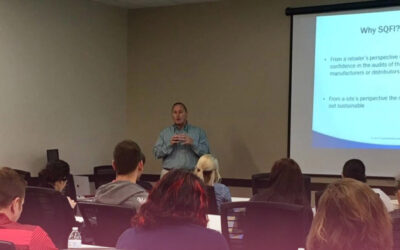Reviewed and Approved by Justin Derington, Director of Auditing Services, FSNS Certification & Audit
1-Minute Summary
- Food Safety and Quality Culture (FSQC) is shaped by shared values and norms affecting food safety attitudes and behaviors, focusing on proactive risk mitigation and consumer trust.
- SQF, BRCGS Food Safety, and FSSC 22000 require developing an FSQC, incorporating specific clauses for maintaining and documenting food safety objectives and practices.
- Auditors look for detailed, documented FSQC strategies in an organization, focusing on established processes, success evaluations, and management reviews.
- Common challenges in developing FSQC include lack of upper management buy-in, leading to non-conformities in food safety programs and audit failures.
What is “Food Safety and Quality Culture”?
The food and beverage industry has been shifting toward a proactive approach to safety and quality and away from a reactionary model for several years. The emphasis now is upon developing a strong Food Safety and Quality Culture (FSQC) within your organization.
A Food Safety and Quality Culture is defined as the shared values, beliefs, and norms that affect mindset and behavior toward food safety across your organization.
Fostering a commitment to excellence that permeates an organization helps proactively mitigate risks, enhance efficiency, and built consumer trust. In short, your Food Safety and Quality Culture should influence how things are done throughout the organization – even if no one is watching.

Which Food Safety Certifications Require a Food Safety and Quality Culture?
Most GFSI-benchmarked food safety certification standards include clauses that require development of a Food Safety and Quality Culture in your organization, including the three most popular:
Let’s review the FSQC requirements in each of these standards.
SQF Clause 2.1.1.2
The clause states:
Senior site management shall lead and support a food safety culture within the site that ensures at a minimum:
- i. The establishment, documentation, and communication to all relevant staff of food safety objectives and performance measures;
- ii. Adequate resources are available to meet food safety objectives;
- iii. Food safety practices and all applicable requirements of the SQF System are adopted and maintained;
- iv. Employees are informed and held accountable for their food safety and regulatory responsibilities;
- v. Employees are positively encouraged and required to notify management about actual or potential food safety issues; and
- vi. Employees are empowered to act to resolve food safety issues within their scope of work.

BRCGS Clause 1.1.2
The clause states:
The site’s senior management shall define and maintain a clear plan for the development and continuing improvement of a food safety and quality culture. The plan shall include measures needed to achieve a positive culture change.
This shall include:
- defined activities involving all sections of the site that have an impact on product safety. As a minimum, these activities shall be designed around:
- clear and open communication on product safety
- training
- feedback from employees
- the behaviours required to maintain and improve product safety processes
- performance measurement of activities related to the safety, authenticity, legality, and quality of products
- an action plan indicating how the activities will be undertaken and measured, and the intended timescales
- a review of the effectiveness of completed activities.
- The plan shall be reviewed and updated at least annually, at a minimum.

FSSC 22000 Clause 2.5.8
The clause states:
- a) In accordance with and in addition to clause 5.1 of ISO 22000:2018, as part of the organizations’ commitment to cultivating a positive food safety and quality culture, senior management shall establish, implement and maintain a food safety and quality culture objective(s) as part of the management system. The following elements shall be addressed as a minimum:
- Communication,
- Training,
- Employee feedback and engagement, and
- Performance measurement of defined activities covering all sections of the organization impacting on food safety and quality.
- b) The objective(s) shall be supported by a documented food safety and quality culture plan, with targets and timelines, and included in the management review and continuous improvement processes of the management system.

Auditor Insights – How to Prepare for a Food Safety Certification Audit
Certification standards for your Food Safety and Quality Culture can pose unique challenges in both understanding and practical implementation. Terms like “cultivating a Food Safety and Quality Culture” or “achieving positive cultural change” often raise questions about their tangible application within an organization.
To shed light on these concepts, we consulted Justin Derington, Director of Auditing Services at FSNS Certification & Audit. Drawing on his extensive real-world auditing experience, Derington provided insights into how organizations can comprehend their specific requirements and effectively develop a Food Safety and Quality Culture.
Q: What Does the Auditor Expect to See in an Organization to Establish, Implement, and Maintain a FSQC?
Derington: ‘Food Safety and Quality Culture’ is an enigmatic term, but successful implementation doesn’t include many requirements. In fact, reviewing a site’s FSQC is only a four-step process:
- Evaluate the written program.
- Review the results.
- Identify the weak points.
- Review actions taken.
The first thing we look for is evidence of a site’s overall strategy for establishing a Food Safety and Quality Culture. It should be defined in your written program and should answer these questions:
- What are we going to do?
- What’s our process to evaluate and improve our FSQC?
- How will you evaluate success?
It’s vital that you capture this information because you can’t improve if you don’t know where you are today.
We expect to see detail in the written program. For example, regarding your process of evaluating the success of your FSQC, include details about the activities your organization will take during that process. For example, some sites have employees take a survey with questions related to food safety to gauge success.
Others evaluate success on an outcome basis, such as the number of food safety or quality complaints reported over time. How often are you going to evaluate complaints? How will you address safety or quality gaps in your program? For example, if employees say they’re not being told what the top food safety concerns are in the organization, we want to see that action has been taken to fill that gap.
Finally, we want to see evidence of all these activities, such as a review of your FSQC by top management, including documentation of when the review was completed, how it was done, and by whom.

Q. What are the Top Challenges Organizations Face When Developing an FSQC?
Derington: The top challenge we see is upper management not buying in to the importance of a robust Food Safety and Quality Culture. Quality Unit personnel know the importance and benefits of a FSQC, but they sometimes struggle to convince management, which makes their job tougher.
One the flip side, once upper management buys in, sites tend to do much better on their audits and reap a lot of benefits from having an FSQC. When everyone in the organization buys in, sites typically have fewer complaints, implement more effective preventive measure, reduce stress, and save money. This top-down commitment also improves safety and quality, which is the whole point.
What are the Top Observances Cited When Auditing the FSQC?
Derington: Again, it often relates to upper management’s lack of commitment and follow-through. Your organization’s Mission Statement must include a commitment to your Food Safety and Quality Culture, which is one non-conformity we often see.
Failure to follow-through is another. Sites sometimes create detailed food safety programs with actions defined, but nothing is done about it. Sometimes, they perform a FSQC survey but never follow up on the results. Or they acted upon their program the first year but forgot about it after that. Again, many non-conformances spring from a lack of management commitment.
View the Top 10 Reasons for an SQF Audit Non-Conformity
View the Top 10 Reasons for a BRCGS Food Safety Audit Non-Conformity
View the Top 10 Reasons for an FSSC 22000 Food Safety Audit Non-Conformity
What Can Organizations do to Prevent Such Observances?
Derington: Get commitment from upper management and your peers in the organization. Obviously, that’s easier said than done.
One tactic that can help is to assign the overall responsibility of food safety and quality to the Plant Manager or other member of upper management instead of the Quality Unit. This helps ensure more people are involved across the organization. Getting a top person committed to safety and quality helps everyone.
What Positive Impacts Have You Seen as a Result of a Well-Implemented FSQC?
Derington: Sites with a well-implemented Food Safety and Quality Culture have more involvement from upper management throughout the audit, which typically improves results.
Anecdotally, we notice that employees demonstrate increased knowledge of food safety, quality, and their role in the process during audit interviews. People get out of their silos and everyone works on the same food safety team, helping improve safety, quality, and audit performance.
Need to Talk to a Certification & Audit Specialist?




